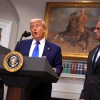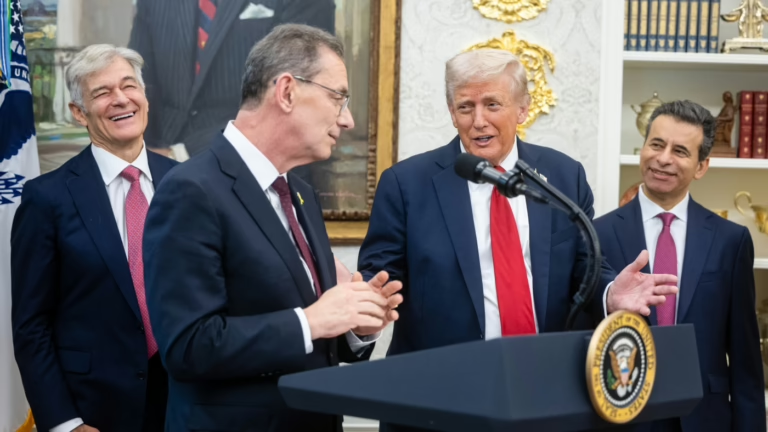Mehmet Oz, head of the Centers for Medicare & Medicaid Services, Albert Bourla, Pfizer’s CEO, President Trump, and FDA Commissioner Martin Makary convened in the Oval Office to unveil a new drug pricing initiative.
Francis Chung/Politico/Bloomberg via Getty Images
On Tuesday, President Trump revealed a new agreement with Pfizer to offer its medications directly to consumers at reduced prices through a government-managed platform named TrumpRx.gov. The administration indicated that similar partnerships with other pharmaceutical companies are forthcoming.
This online portal is a component of a larger strategy aimed at aligning the prices Americans pay for prescription drugs-including those covered by Medicaid-with the lower costs seen in other advanced economies. This approach, often referred to as most-favored-nation pricing, ensures Pfizer will set prices for new medications in the U.S. equivalent to those in other developed nations.

“American consumers have been shouldering the financial burden of pharmaceutical research and development globally,” President Trump stated during a press briefing alongside Pfizer’s Albert Bourla and key health officials. “Others have benefited from this investment without bearing the cost, but that is changing now.”
Pfizer’s CEO Bourla echoed this sentiment, saying, “Today marks a turning point as we address an inequitable system and work toward fairer drug pricing.”
According to senior administration sources speaking anonymously, the TrumpRx.gov platform is slated to launch in 2026. It will redirect users to pharmaceutical companies’ own direct-to-consumer sites to complete purchases.
Pfizer announced that prices on TrumpRx.gov will average 50% less than current direct-to-consumer rates. However, the company has kept the specifics of the discount calculations confidential, stating, “Certain terms of the agreement remain proprietary.”
Discounts Target Uninsured Patients
Unlike many other countries where government-run health systems regulate drug prices, the U.S. largely allows pharmaceutical companies to set prices based on market demand, often resulting in higher costs.
Officials clarified that the discounted prices on TrumpRx.gov will only be available to patients purchasing medications without using insurance. Even then, these discounts may not always translate to affordability, as they are based on the high list prices of drugs. For insured patients, copays or negotiated rates at pharmacies might still be lower.
Harvard Medical School’s Ameet Sarpatwari, an expert in pharmaceutical policy, expressed skepticism about the deal’s impact, stating, “This initiative is unlikely to deliver the sweeping relief Americans need. It feels more like a symbolic gesture than a substantive reform.”
Bourla also committed to launching new drugs in the U.S. at prices consistent with those in other developed countries and to offering Medicaid drugs at most-favored-nation rates. Health Secretary Robert F. Kennedy Jr. praised this as a pioneering example of corporate accountability prioritizing public health over profits.
Medicaid Prices Already Competitive
Sarpatwari noted that Medicaid already benefits from relatively low drug prices and that beneficiaries typically pay minimal out-of-pocket costs. Therefore, the new agreement may not significantly reduce expenses for Medicaid recipients or taxpayers.
“This is a scenario where the appearance of reform masks the reality that drug prices for most Americans won’t change meaningfully,” Sarpatwari added.
This announcement follows an executive order issued by the Trump Administration in May aimed at lowering prescription drug costs. The president emphasized the goal of balancing global drug prices, stating, “While prices in the U.S. will come down, other countries will see modest increases to create fairness.”
Earlier in the year, the administration sent letters to 17 pharmaceutical companies demanding voluntary price reductions in Medicaid, parity in new drug pricing with other countries, and direct-to-consumer sales at lower costs. The letters warned that failure to comply would prompt the government to use all available measures to combat excessive drug pricing.
Negotiations included the potential imposition of tariffs linked to a national security investigation into pharmaceutical imports. Pfizer’s agreement includes a three-year exemption from these tariffs, and Bourla announced a $70 billion investment to bring drug manufacturing back to the U.S. He acknowledged the president’s use of tariffs as a powerful incentive for corporate compliance.



















